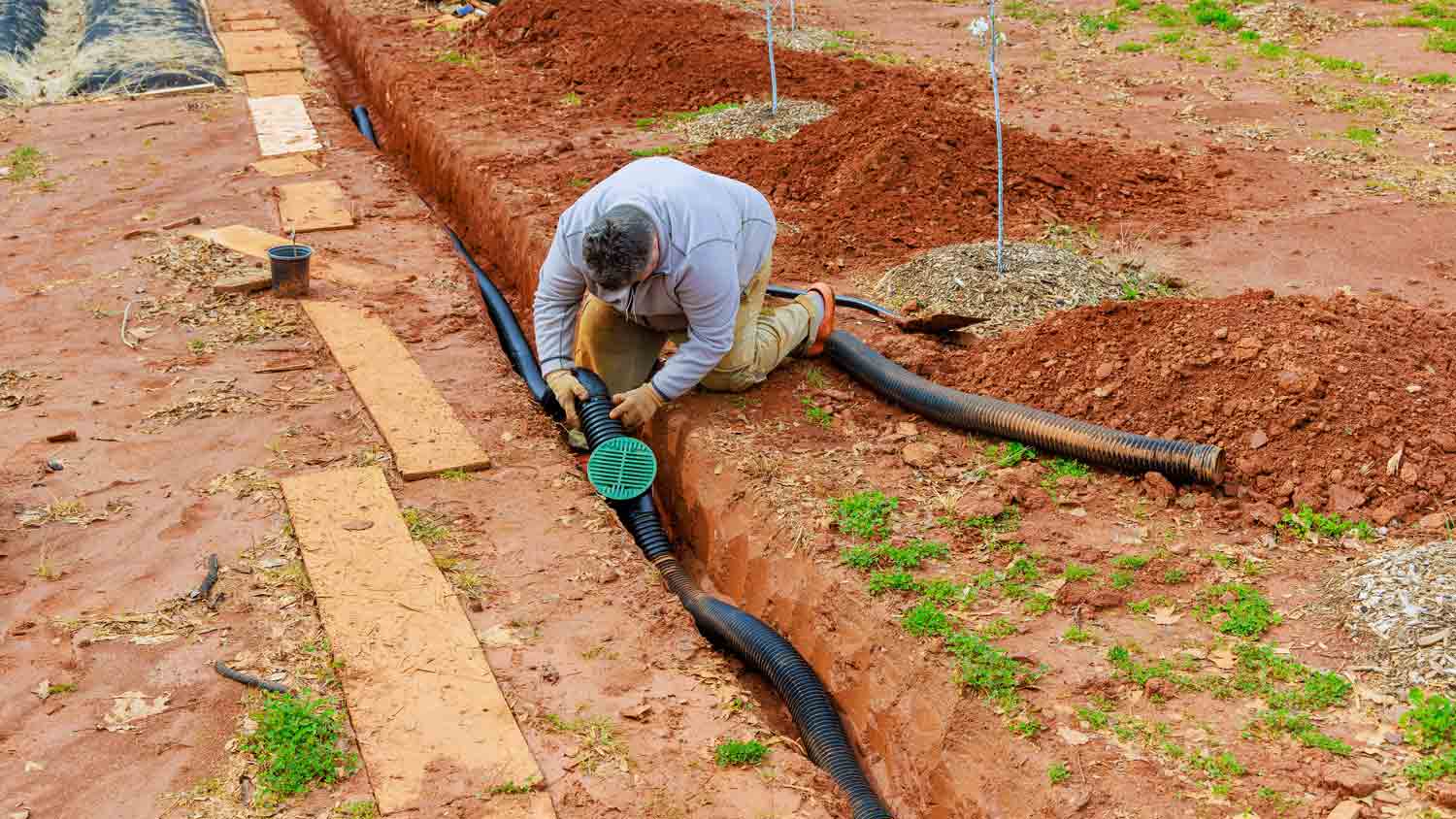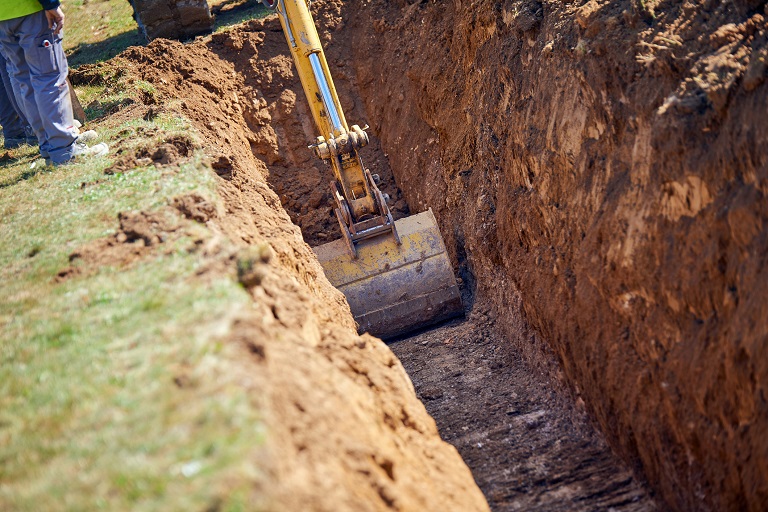
Wondering who installs trench drains? See who to call—excavation companies, plumbers, or landscapers—plus costs and how pros get it done
The average cost to excavate land is $3,979


A residential excavation job costs between $500 and $15,000, with an average price of $3,979.
Accessibility, terrain, and other factors influence your total excavation costs.
You’ll also need to budget for additional costs, such as dirt removal and contamination cleanup.
You’ll need excavation for new building foundations, basements, and other home projects.
Hiring an excavation contractor for your project ensures safety and professional results.
This article was updated using automation technology and thoroughly reviewed for accuracy by HomeAdvisor Editor Ryan Noonan.
Expect to spend an average of $3,979 for excavation, with most jobs falling within the range of $1,659 to $6,709. Excavation isn’t a one-size-fits-all service. Where you live, the size of the dig, and even how often you break ground all influence the final price. Plan your budget and rely on a licensed excavation professional to keep the site safe, efficient, and on schedule.
The cost of excavation varies significantly depending on factors such as the size and accessibility of the area, soil and land conditions, labor requirements, and cleanup costs.
Most residential excavators have a minimum fee, so even a tiny trench can trigger a base charge. Your site’s accessibility determines which machine appears. A compact skid steer or backhoe costs $100 per hour, including the cost of an operator. If your driveway can handle a full-sized excavator, plan on roughly 50% more per hour—but the larger bucket can significantly reduce overall labor time.
Rocky terrain or stubborn, clay-heavy soil can tack on $200 to $1,200—or more. Loose, obstacle-free dirt is the budget-friendlier scenario. If your lot is peppered with trees, boulders, or heavy clay, expect the crew to work more slowly and charge accordingly.
Cut-and-fill work runs $1 to $12 per cubic yard. Haul distance matters—moving dirt a couple of hundred feet costs far less than trucking it five miles away. Most hillside digs land between $1,000 and $5,000. Location, access, and project scope all influence the price, either up or down.
Expect excavation equipment rentals to cost between $100 and $250 per hour, including the cost of an operator. Combined labor and machine rates range from $120 to $150 per hour; however, larger, faster rigs can significantly reduce job time.
If your land is challenging to access, your crew may need to switch to smaller dump trucks and make extra trips, which can increase the bill. Most excavators also require a minimum of a full day, and general contractors often quote a flat project rate instead of charging by the hour.
Frozen ground and icy job sites slow down digging and can stretch your timeline. Most crews carry the necessary attachments for winter work, but you’ll still incur additional costs if snow or ice requires extra hours.
If you’re planning a cold-weather dig, discuss the potential pitfalls with your contractor so that surprises don’t impact your budget. Even with modern gear, weather delays remain a wildcard, though many general contractors build that risk into their bids.
Before the first scoop of dirt is taken, the site must be cleared. Removing trees, shrubs, and debris costs between $1,400 and $5,800. If you need to add on grading, plan for an additional $400 to $6,500.
Hauling dirt off-site runs $8 to $25 per cubic yard. If you have easy access for a dump truck, your total costs will stay near the lower end. Tight spaces that require wheelbarrows—or a long haul to the disposal site—push the price toward $25.
Many properties require cleanup before excavation can begin. Budget $700 to $2,200 for the cost of soil testing and any contamination cleanup before digging starts.
Many home projects require excavation, ranging from patio remodels to the installation of a brand-new foundation. Your costs vary widely depending on the scope of work, site accessibility, soil type, and the required depth of excavation. The table below outlines common projects that require excavation and their average costs.
| Project | Average Cost |
|---|---|
| Patios and driveways | $1,000–$2,500 |
| Basements and waterproofing | $5,000–$15,000 |
| Crawl spaces | $5,000–$15,000 |
| New construction foundations | $1,500–$10,000 |
| Swimming pools | $400–$1,500 |
| Rock blasting | $40–$100 per cubic yard |
| Plumbing & septic tanks | $1,500–$10,000 |
| Yard grading | $400–$6,500 |
To keep your project within budget, consider the following cost-saving tips:
Book during the off-season when pros are less busy and rates dip.
Trim the dig depth or footprint if you don’t truly need the extra space.
Reuse clean fill on-site for landscaping instead of paying to haul it away.
Bundle tasks—such as grading, trenching, and clearing—so that the crew and equipment only mobilize once.
Get at least three quotes from reputable land-clearing professionals near you or concrete removal contractors before you book
No place is more important than your home, which is why HomeAdvisor connects homeowners with local pros to transform their houses into homes they love. To help homeowners prepare for their next project, HomeAdvisor provides readers with accurate cost data and follows strict editorial guidelines. We surveyed thousands of real customers about their project costs to develop the pricing data you see, so you can make the best decisions for you and your home. We pair this data with research from reputable sources, including the U.S. Bureau of Labor Statistics, academic journals, market studies, and interviews with industry experts—all to ensure our prices reflect real-world projects.
From average costs to expert advice, get all the answers you need to get your job done.

Wondering who installs trench drains? See who to call—excavation companies, plumbers, or landscapers—plus costs and how pros get it done

Find who can dig a trench for me and who to hire. Learn pro benefits, DIY costs, and when to call an excavation expert

Who to hire to clear land? Learn when to call specialists vs arborists or mulchers, what it costs, and how pros get it done safely.

If you need to clear a plot of land, you can expect to budget based on the lot size, amount of vegetation, permits, and more.

Budget for oil tank removal costs based on factors such as tank location, size, type, soil testing, professional labor, and more.